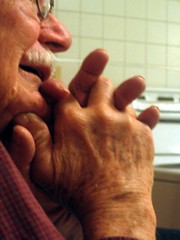Dragon Mood? --
enthused
Now that I'm exploring some educational opportunities, my interest in creativity, specifically MINE, is on the rise. Here's an article from
PsyBlog that caught my eye. (I've copied it in its entirety so I can reference it in the future and not find a frustrating broken link.)
Boost Creativity: 7 Unusual Psychological Techniques
Looking for the last piece of the puzzle? Try these 7 research-based techniques for increasing creativity.
Everyone is creative: we can all innovate given time, freedom, autonomy, experience to draw on, perhaps a role model to emulate and the motivation to get on with it.
But there are times when even the most creative person gets bored, starts going round in circles, or hits a cul-de-sac. So here are 7 unusual creativity boosters that research has shown will increase creativity:
1. Psychological distance
People often recommend physical separation from creative impasses by taking a break, but psychological distance can be just as useful.
Participants in one study who were primed to think about the source of a task as distant, solved twice as many insight problems as those primed with proximity to the task (Jia et al., 2009).
◊ For insight: Try imagining your creative task as distant and disconnected from your current location. This should encourage higher level thinking.
2. Fast forward in time
Like psychological distance, chronological distance can also boost creativity.
Forster et al. (2004) asked participants to think about what their lives would be like one year from now. They were more insightful and generated more creative solutions to problems than those who were thinking about what their lives would be like tomorrow.
Thinking about distance in both time and space seems to cue the mind to think abstractly and consequently more creatively.
◊ For insight: Project yourself forward in time; view your creative task from one, ten or a hundred years distant.
3. Absurdist stimulation
The mind is desperate to make meaning from experience. The more absurdity it experiences, the harder it has to work to find meaning.
Participants in one study read an absurd short story by Franz Kafka before completing a pattern recognition task (Proulx, 2009). Compared with control participants, those who had read the short story showed an enhanced subconscious ability to recognise hidden patterns.
◊ For insight: read Alice in Wonderland, Kafka's Metamorphosis, or any other absurdist masterpiece. Absurdity is a 'meaning threat' which enhances creativity.
4. Use bad moods
Positive emotional states increase both problem solving and flexible thinking, and are generally thought to be more conducive to creativity. But negative emotions also have the power to boost creativity.
One study of 161 employees found that creativity increased when both positive and negative emotions were running high (George & Zhou, 2007). They appeared to be using the drama in the workplace positively.
◊ For insight: negative moods can be creativity killers but try to find ways to use them—you might be surprised by what happens.
5. Combining opposites
Interviews with 22 Nobel Laureates in physiology, chemistry, medicine and physics as well as Pulitzer Prize winning writers and other artists has found a surprising similarity in their creative processes (Rothenberg, 1996).
Called 'Janusian thinking' after the many-faced Roman god Janus, it involves conceiving of multiple simultaneous opposites. Integrative ideas emerge from juxtapositions, which are usually not obvious in the final product, theory or artwork.
Physicist Niels Bohr may have used Janusian thinking to conceive the principle of complementarity in quantum theory (that light can be analysed as either a wave or a particle, but never simultaneously as both).
◊ For insight: set up impossible oppositions, try ridiculous combinations. If all else fails, pray to Janus.
6. Path of most resistance
When people try to be creative they usually take the path of least resistance by building on existing ideas (Ward, 1994). This isn't a problem, as long as you don't mind variations on a theme.
If you want something more novel, however, it can be limiting to scaffold your own attempts on what already exists. The path of most resistance can lead to more creative solutions.
◊ For insight: because it's the path of least resistance, every man and his dog is going up and down it. Try off-road
7. Re-conceptualisation
People often jump to answers too quickly before they've really thought about the question. Research suggests that spending time re-conceptualising the problem is beneficial.
Mumford et al. (1994) found that experimental participants produced higher quality ideas when forced to re-conceive the problem in different ways before trying to solve it. Similarly a classic study of artists found that those focused on discovery at the problem-formulation stage produced better art (Csikszentmihalyi & Getzels, 1971).
◊ For insight: forget the solution for now, concentrate on the problem. Are you asking the right question?
Everyday creativity
Despite all the high falutin talk of Nobel Prize winners and artists, all of these methods can be applied to everyday life.
Combining opposites, choosing the path of most resistance, absurdism and the rest can just as easily be used to help you choose a gift for someone, think about your career in a new way or decide what to do at the weekend. 'Off-duty' creativity is just as important, if not more so, than all that 'serious' creativity.
